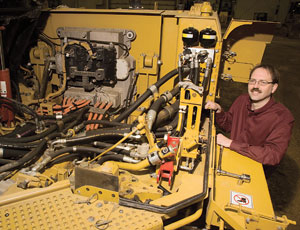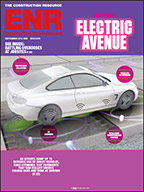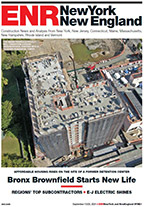like a protective parent, Mike Betz winces a little when people call the D7E a “hybrid” tractor. The diesel-electric dozer may have hybrid-like qualities. For example, it reuses some mechanical energy at the flywheel, but it shares very little DNA with a Toyota Prius. “It is different because this machine cycles back and forth,” says Betz. “It’s not like a car where you sit at a stoplight for a minute or two.”

Betz, 44, quietly led the team that developed Caterpillar Inc.’s first electric-drive dozer. At first glance, Betz comes off as a soft-spoken, shy engineer. Ask him about D7E, and his voice turns passionate. “It’s definitely new, emerging technology, and it’s exciting,” Betz says. The machine costs about $600,000, 20% more than a non-hybrid tractor, but it promises a 25% fuel-efficiency edge and a 2½-year payback. Last year, it earned a clean-air award from the U.S. Environmental Protection Agency.
Sure, electric drive has been around for more than a century (electric cars once outnumbered internal-combustion vehicles 10 to one, and many locomotives are diesel-electric), but the 10-year project still generated about 100 new patents. Much research focused on controlling the variable, twin 80-kW electric motors independently of the 235-hp diesel engine, which runs at a relatively steady speed. Few had applied the concept to a ground-engaging vehicle such as a dozer. “We became experts in developing that technology,” says Betz.
Betz led the Caterpillar Inc. engineering team that researched and developed the first mass-produced, diesel-electric bulldozer, a 10-year project that resulted in about 100 new patents.
Even in his free time, Betz likes to play with performance machines, especially muscle cars. In his garage are four Chevelles: a 1965 Super Sport convertible, ’67 SS, ’69 SS and a ’71. He tinkers with a turbocharged ’86 Buick Regal TType and has a Chevy pickup with 314,000 miles on it. “I like all kinds of cars,” he says.
Contractors can be quite stubborn to change, but early users are already applauding Betz’s fuel-efficient dozer. “For us who are on the ground every day and in the dirt, it really is a home run,” says Dan Klingberg, president of Joliet, Ill.-based T.J. Lambrecht Construction Co., which bought the first production D7E last month. With it, Cat “hit some of the most sensitive issues we deal with, day in and day out.”
A natural target for D7E is California, which has rules on its books banning smoke-belching diesels. It also comes during an automotive shift toward electrics. “There is absolutely the regulatory requirement, and the societal demand for cleaner, off-road equipment is going to intensify,” says Dan Sperling, a professor at University of California-Davis, member of the state’s Air Resources Board and author of “Two Billion Cars: Driving Toward Sustainability.”
Whether or not other contractors will pay the price remains to be seen, but Klingberg says the efficiency advantage alone is a huge selling point. “Fuel is probably the single-largest component to operating our fleet today,” he explains. Sperling adds that such revolutionary off-road machines are long overdue. “They were not very aggressively regulated until recently,” he says. “So in one sense they are two decades behind gasoline engines.”




Post a comment to this article
Report Abusive Comment